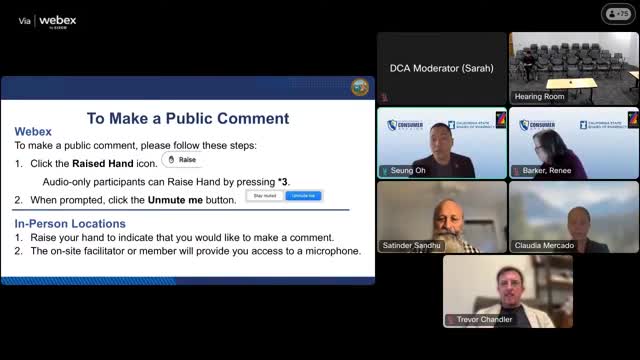Licensing committee hears experts on pharmacy intern hours as ACPE updates take effect
Get AI-powered insights, summaries, and transcripts
Subscribe
Summary
Presenters and public commenters told the Licensing Committee the new ACPE Standards 2025 raise experiential-hour minimums and limit non–patient-care electives, prompting questions about California's 1,500-hour licensure requirement and how accelerated programs and residency paths intersect with it.
The California State Board of Pharmacy Licensing Committee on Oct. 15 heard three expert presentations and multiple public comments about pharmacy experiential requirements after the Accreditation Council for Pharmacy Education (ACPE) updated its standards.
Speakers described Standards 2025 as raising experiential expectations and emphasizing that graduates must be "practice ready and team ready," while attendees asked whether California's 1,500-hour licensure rule should be changed or better explained to schools and employers.
The committee said it was reviewing how the national accreditation requirements intersect with the board's licensure rules and welcomed more written information from presenters and stakeholders.
Why it matters: ACPE's Standards 2025 set a national baseline for pharmacy education that all accredited programs must meet. California's licensure statute and board regulations control who may sit for the pharmacist examination. Discrepancies between school-delivered experiential hours and the board's licensure-hour affidavit can create confusion for graduates, schools and employers.
What presenters said - Dr. Sarah McBain, associate dean at the University of California, Irvine, speaking on behalf of the California Pharmacy Council, summarized ACPE Standards 2025 and said they require a minimum of 1,740 hours of experiential education (300 IPPE hours and 1,440 APPE hours) and limit non–patient-care electives to 320 hours. McBain said the standards emphasize assessment, mastery of competencies and that graduates should be "practice ready and team ready." She noted simulation can no longer be counted toward the 300 IPPE hours and that programs must document student exposure to diverse patient populations.
- Dr. James Scott, former dean at Touro University California, told the committee the new national totals still leave California pharmacists subject to the board's 1,500-hour licensure affidavit in practice: "If you take that 1,740 required number of hours and subtract out 240 for the non–patient-care electives...we are still looking at 1,500 hours, which is the basis of the requirement for licensure from the board here in California." He warned that accelerated programs (three-year and 3.5-year programs) make it harder for students to add separate, outside internship hours and that requiring additional external hours could be burdensome.
- Dr. Scott Takahashi, a practicing pharmacist and long‑time preceptor, described benefits of outside work experience as an "apprenticeship," arguing that paid internship hours outside clinical rotations help students learn workplace skills, time management and professional responsibilities that short rotations do not provide. He said some graduates lack familiarity with day‑to‑day pharmacy workflow and cited concern about declining pass rates on California's jurisprudence exam (CPJE).
Public comment and education details Multiple public commenters urged the committee to avoid unintended consequences if it changes licensure-hour rules. Kathleen (Chapman University), an experiential director, told the committee most states do not require hours beyond accredited experiences and noted schools already document hours and require preceptor verification. Kyle Souza, dean of Loma Linda University School of Pharmacy, asked whether the board has data showing that stricter pre‑licensure hour requirements improve patient safety and noted ACPE's authority derives from its federal recognition role (Title IV eligibility).
Staff and committee response Committee members said they were not ready to take immediate regulatory action and suggested exploring incentives or certifications to encourage students to obtain additional on‑the‑job experience rather than imposing a new mandatory external-hours requirement. Members asked staff to gather more written detail from presenters and invited interested stakeholders to submit documentation of specific statutory or regulatory provisions they find burdensome.
Clarifying details - ACPE Standards 2025: total experiential hours 1,740 (IPPE minimum 300; APPE minimum 1,440). - California board licensure affidavit: 1,500 pharmacy practice hours required to apply for licensure (current rule). - Non‑patient‑care APPE cap in Standards 2025: 320 hours.
Next steps Committee members asked staff to collect follow-up materials from presenters and to return the topic to a future meeting. No committee motion was made to change board licensure requirements.
Votes at a glance - Committee action: approval of minutes for 06/12/2025 (see separate entry in actions).
